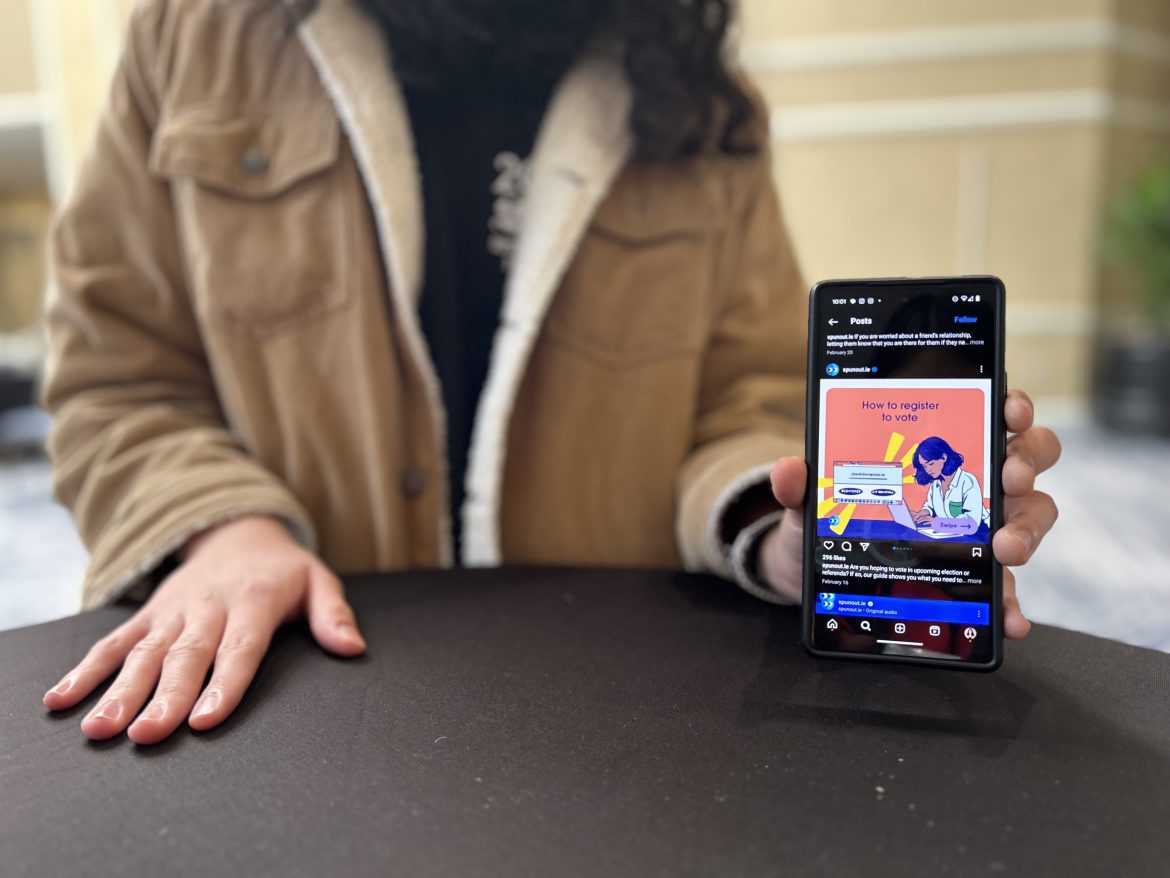A high school student displays an Instagram post detailing voter registration in the Columbia Marriott Hotel on March 2. While 18-year-old Fairhope High School senior Gabriel Irby has yet to register to vote, with the resources available to him, he hopes to register in the future. “We’re the next generation. What our choices will do now will impact this country and pretty much the entire world later on,” Irby said. “I’d probably ask my parents (what to do) because they have experience. And if they didn’t have that knowledge, I would probably go through a lot of social media sources.” Photo by Iliana Tejada
As the 2024 US presidential elections approach, Generation Z’s voting habits have become more and more influenced by social media.
While current political decisions will affect America’s young adults for decades to come, young voters have the lowest election turnout of any age demographic. However, one thing is actively shifting Generation Z’s political landscape — social media.
According to studies by the Pew Research Center, 45% of the US’s voting eligible population turned out to vote in the 2022 midterm election, compared to just 31% of people under the age of 30. T.J. Lundeen, Director of Public Information and Outreach of the South Carolina Election Commission, believes that lack of youth voters is a significant problem.
“Youth voters feel the most dejected about the process. That’s just a lack of representation,” Lundeen said. “When you go and vote and you see someone who’s significantly older than you or who doesn’t share your values, it’s not someone that you will probably be energized to vote for. Maybe you feel that your vote may not count (or) that your vote will be wasted to vote for (a particular) candidate.”
T.J. Lundeen, Director of Public Information and Outreach of the South Carolina Election Commission, stands in the Capital Ballroom IV of the Marriott Hotel on March 2. According to Lundeen, social media can influence youth voters and affect how they view voting. “It’s important for us as the election commission to put out information on our social channels, but also on our website where people can go and verify things on their own,” Lundeen said. “When we are able to put out verifiable information that people can go back, see how it was developed and things that really helps to fight that misinformation.”
Despite the low voter turnout amongst youth, Lundeen believes that social media can make an impact on their decision to vote.
“Social media is now the biggest source of news for most individuals. So making sure that the information is accurate, that people understand what they’re reading and that they use that information to go and cast their ballots,” Lundeen said. “We’ve seen a huge uptick in our uses of social media to make sure that we’re engaging with the youth so that they understand voting is just as important for someone who is 18 as someone who is 65. Social media (makes) sure that the youth feel like they can go out and vote and that it’s something that is important.”
Although 18-year-old Fairhope High School senior Gabriel Irby is not yet registered to vote, he hopes to register in the future with the resources available online.
“We’re the next generation. What our choices will do now will impact this country and pretty much the entire world later on,” Irby said. “I’d probably ask my parents first because they have experience. And if they didn’t have that knowledge, I would probably go through a lot of social media sources.”
Even though youth voter turnout still falls behind compared to the rest of the nation, a study done by Tufts University finds that Gen Z still has a higher youth turnout compared to previous generations at their age.
“As the younger generation, it’s an opportunity for you to let your voice be heard and make an impact,” Lundeen said. “Doing that as early as possible allows you the most amount of time to make change and to go through the opportunity of voting and ensure that what you want to happen, can happen, as long as you turn out and actually cast your ballot.”
More from Anna Shaikun
More from Angel Jara
More from Liza Larson
More from Iliana Tejada
